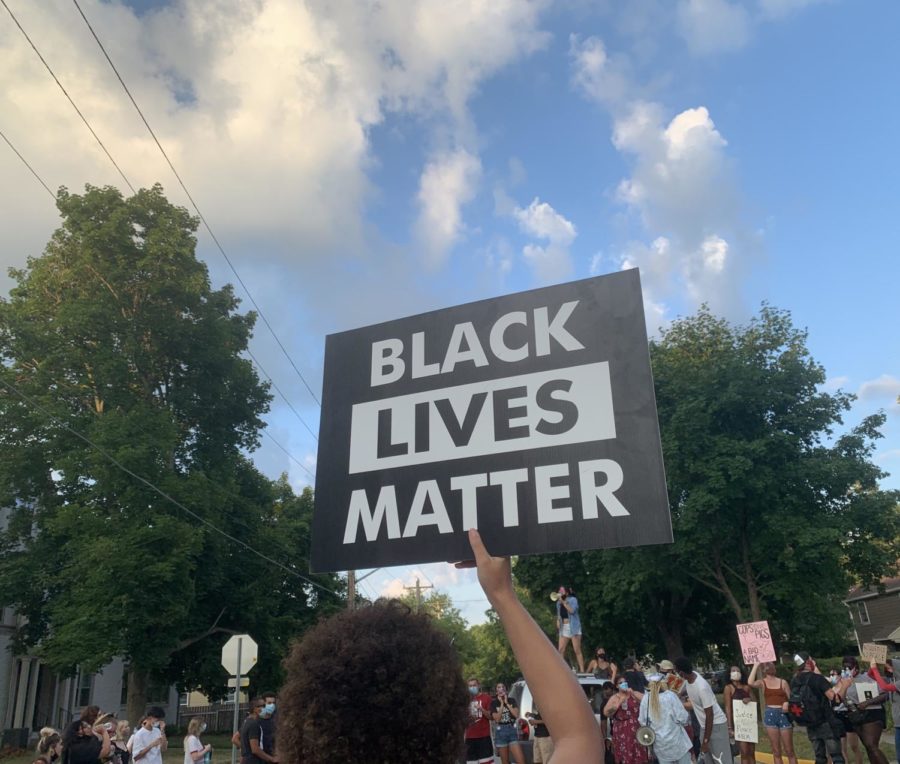Protesters confront city council member on vote to approve delinquent utility notices
On Wednesday evening, a group of 50 protesters gathered in the commuter parking lot in front of Jack Trice Stadium.
July 9, 2020
Protesters confronted Ames City Council Member Bronwyn Beatty-Hansen and the Council’s decision to vote on delinquent utility usage notices Wednesday evening.
“When we look at water usage across the globe, less than 10 percent alone is your individual usage — that’s you showering, that’s you drinking water, that’s you cooking — 20 percent [of water usage is] industry and 70 percent agriculture,” said Ahmed Ismail, a senior in industrial engineering and one of the leaders and organizers of the march. “Why are we getting shut off first in the pandemic? On top of that 55 million claims for unemployment since April […] why are we not supporting our people?”
The Ames City Council voted on June 23 to approve the resumption of utility collections including disconnects with the following changes to the regular policy, withhold sending notices until next regular billing cycle even though a customer is already delinquent to the point of a disconnect notice, allowance for a payment plan in those situations where such a plan had been in place but terms were broken and offer additional options for financial assistance, according to city documents.
Beatty-Hansen, who voted in favor of the decision, said there is a miscommunication of the Council’s vote.
“I would promise I would not vote to shut off anyone’s water,” Beatty-Hansen said.
Beatty-Hansen clarified her vote in an interview with the Daily, and she said the Council members asked city staff if utilities were going to shut off if they voted for the delinquent utility notice.
“The vote was not like ‘yes shut off utilities after the first and second notices had gone out,’ the vote was go ahead and send these notices so we can try to connect people to these funding resources […] I think we’re all very cognizant that we don’t want putting people in a dangerous situation in a pandemic year by shutting off any utilities,” Beatty-Hansen said. “Our vote was to revisit that after we send out some of the notices.”
The group of about 50 protesters gathered in the commuter parking lot in front of Jack Trice Stadium. In the surrounding lots, three state patrol officers, one Iowa State Police Department car and one Ames Police Department car faced and parked toward the scene.
Before everything started, the organizers went over the safety plan:
-
March shoulder to shoulder at all times
-
Friends don’t let friends get arrested
-
Don’t panic
-
Understand the “retreat” sign
-
Understand the “medic” sign
-
No “funny business” with the police
“This is not a peaceful protest, but this is not a violent protest,” Ismail said.
Several Ames police officers followed the group and blocked traffic along the route of the march each time the group stopped.
The group marched through the neighborhoods chanting “Ain’t no power like the power to the people cause the power of the people don’t stop,” to the intersection of Lynn Avenue and Knapp Street. By then, about 100 people had gathered for the protest.
Jo Allen, a senior at Iowa State and part of Ames Black Lives Matter movement shared the story of Elijah McClain, a 23-year-old Black man from Aurora, Colorado, who was walking home from a convenience store in August when someone called the police, saying he “looked sketchy” and was wearing a ski mask and waving his arms.
Police arrived and restrained him with a chokehold. The officers brought him to the ground and used a carotid hold, which restricts blood to the brain to render someone unconscious. When medical responders arrived, after about 15 minutes, paramedics injected him with ketamine, a powerful sedative.
McClain went into cardiac arrest on the way to a hospital. He died a few days later.
“My brother’s name is Elijah, he’s 14, he’s Black and he doesn’t understand what’s going on — he doesn’t understand that his skin puts a target on his back,” Allen said. “My parents don’t tell him what it’s like to be Black. My brother, he’s special. He’s a little different too, he doesn’t have many friends. My brother could be Elijah. My brother is Elijah. I don’t want to see all of these people continuing to die and if [McClain’s] story — if his last words don’t make you mad, I don’t know what will.”

















